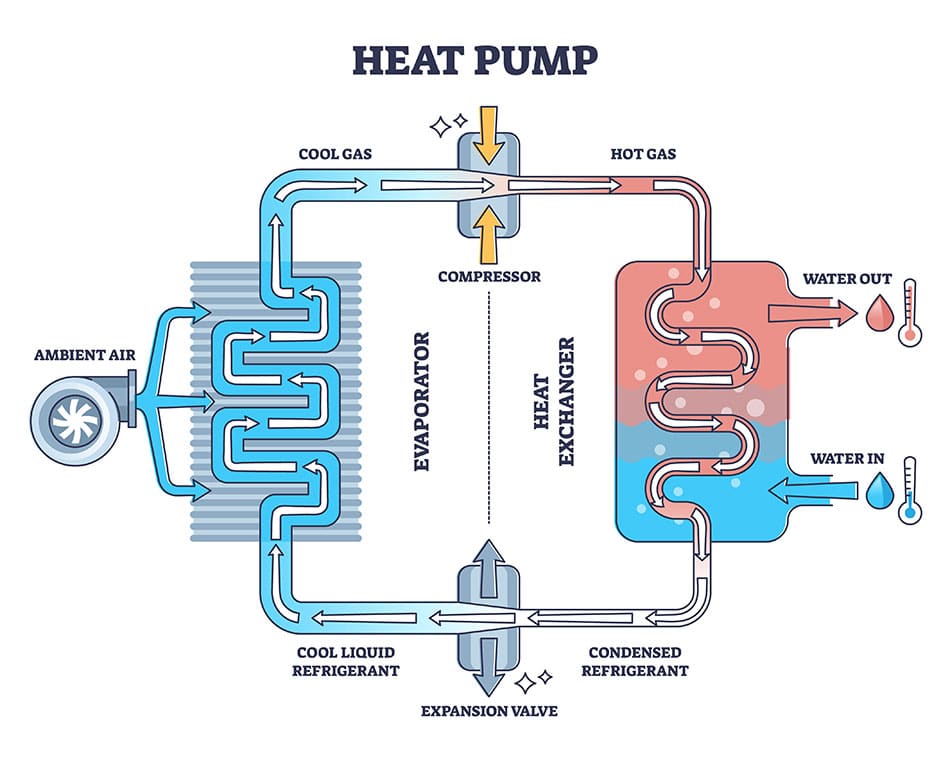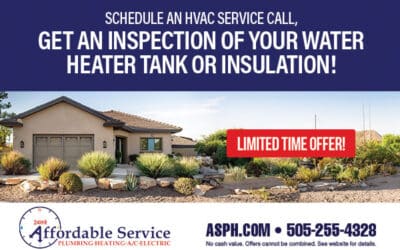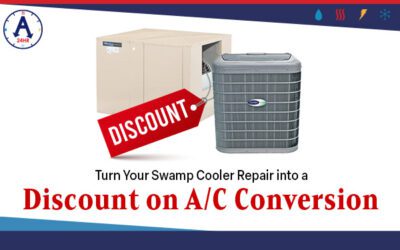Heat Pumps: Efficient Heating and Cooling Solutions with Tax Incentives for New Mexicans
Heat pumps are not only an efficient solution for heating and cooling your home, but they also offer the opportunity for tax incentives from federal programs. By using renewable heating, you can save energy, reduce your carbon footprint, and potentially benefit from federal incentives aimed at promoting energy efficiency. This makes heat pumps a popular choice for modern homes. As energy costs rise and environmental concerns grow, more homeowners are turning to these systems for their efficiency and potential financial rewards.
How These Systems Work
A climate control system works by transferring heat from one place to another. This process involves a heat exchanger, which absorbs and releases heat. This allows the system to either heat or cool a space efficiently. Unlike traditional heating systems that generate heat, these systems move heat, making them significantly more efficient.
Key Components:
- Heat Exchanger: Essential for transferring heat.
- Refrigerant: Circulates through the system, absorbing and releasing heat.
- Compressor: Moves the refrigerant through the system.
- Expansion Valve: Regulates the flow of refrigerant.
These systems use electricity to power these components, ensuring efficient heating and cooling, leading to potential federal tax credits due to their environmental benefits.
Types of Systems – Comparison
Heating and cooling units come in various types, each suited to different environments and needs. Understanding the differences can help you choose the best system for your home and maximize your eligibility for federal incentives.
Air Source Heat Pump
An air-source heat pump extracts heat from the air outside and transfers it indoors. This type is one of the most common due to its simplicity and cost-effectiveness. We currently install and maintenance these types of heat pumps.
Benefits: Easy to install, energy-efficient.
Ideal For: Mild climates where the temperature does not drop too low.
Ground Source Heat Pumps
Ground-source heat pumps, also known as geothermal systems, use stable temperatures underground to generate heat. They are more efficient than air-source systems but involve a more complex installation process. We currently do not install or maintain these types of heat pumps.
Benefits: Highly efficient, long lifespan.
Ideal For: Consistent heating and cooling needs, particularly in areas with extreme temperatures.
Advantages of These Systems
These systems offer several advantages over traditional heating appliances. These benefits make them an attractive option for homeowners looking to improve their home’s energy efficiency and take advantage of federal tax incentives.
- Energy Efficiency: These systems use electricity to move heat, which is more efficient than using fossil fuels. This can lead to significant energy savings over time.
- Combo System: They can provide both heating and cooling, eliminating the need for separate systems.
- Environmentally Friendly: Reduced reliance on fossil fuels lowers carbon emissions, contributing to a greener planet and making you eligible for federal rebates.
Installation and Maintenance
Efficient installation is crucial for the optimal performance of these systems. Proper maintenance ensures longevity and efficiency, preventing costly repairs and ensuring consistent performance. Federal programs offer incentives to promote the use of such energy-efficient systems.
Installation Tips:
- Choose the Right Size: Ensure the system is properly sized for your home to maximize efficiency and rebate eligibility.
- Professional Installation: Our certified professionals install your system, avoiding common pitfalls and ensuring everything is set up correctly.
- Location: Place the outdoor unit in a protected area to shield it from harsh weather, which can impact how well it works.
Maintenance Tips:
- Regular Inspections: Check for refrigerant leaks and ensure components are functioning correctly. Regular inspections can prevent minor issues from becoming major problems.
- Clean Filters: Regularly clean or replace filters to maintain airflow and efficiency. Dirty filters can reduce efficiency and strain the system.
- Seasonal Checks: Check your system before the peak heating or cooling seasons to ensure it runs efficiently when you need it.

Cost: Heat Pumps vs. Traditional Heating and Cooling Systems
When considering a new heating and cooling system, affordability is a major factor. Comparing the costs of these systems with traditional heating and cooling systems can help you make an informed decision and benefit from federal incentives.
Initial Costs
- Heat Pumps: The upfront cost of installing a renewable heating solution can be higher than traditional systems. This is especially true for ground-source heat pumps, which require extensive installation work. However, federal tax credits can help offset these costs.
- Traditional Systems: Old-fashioned heating and cooling systems like furnaces and air conditioners usually cost less at first.
Operational Costs
- Heat Pumps: Although the initial investment is higher, these systems are more energy-efficient, leading to lower operational costs. They use electricity to move heat, which is more cost-effective than generating heat from fossil fuels.
- Traditional Systems: These systems often have higher operational costs due to their reliance on fossil fuels. Heating with natural gas or oil and cooling with electricity can add up over time.
Maintenance Costs
- Heat Pumps: Regular maintenance is needed for long life and efficiency. Costs for maintenance are usually lower than for traditional systems. A well-maintained climate control system can last 15-20 years.
- Traditional Systems: Maintenance costs can be higher due to the need for servicing separate heating and cooling units. Additionally, the lifespan of these systems is often shorter, leading to more frequent replacements.
Long-Term Savings
- Heat Pumps: Over time, the energy efficiency of these systems translates to significant savings on utility bills. The initial investment can be offset by the reduction in energy costs, and federal tax incentives make them even more attractive.
- Traditional Systems: These may cost less at first, but they can end up costing more in the long run due to higher operational and maintenance expenses.
FAQs
What is a Heat Pump?
A heat pump is a device that transfers heat from one place to another, providing heating and cooling. Unlike traditional systems that generate heat, this temperature regulation device moves heat, making it more efficient.
How Does a Heat Pump Work?
A heat pump works by using a refrigerant to absorb and release heat, moving it between the indoors and outdoors. This process is managed by key components such as the heat exchanger, compressor, and expansion valve.
What Are the Benefits of Using a Heat Pump?
Benefits include energy efficiency, versatility in heating and cooling, and reduced carbon emissions. These systems can also lower energy bills and provide consistent comfort throughout the year.
How Long Does a Heat Pump Last?
With proper maintenance, a heat pump can last between 15 to 20 years. Regular inspections and timely repairs can extend the system’s lifespan and maintain its efficiency.
Are Heat Pumps Suitable for All Climates?
These systems are versatile and can work in various climates. However, their efficiency may vary based on the type of heat pump and the specific climate conditions. For extremely cold climates, a ground-source system might be more efficient.
What Types of Heat Pumps Are Available?
There are several types of heat pumps, including air source and ground source systems. Each type has its benefits and is suited to different environments and needs.
Take Advantage of Federal Tax Incentives
Installing a heat pump not only enhances your home’s energy efficiency but also qualifies you for federal tax rebate programs. These incentives aim to encourage homeowners to adopt environmentally friendly and energy-efficient solutions. By choosing a heat pump, you can enjoy a comfortable home environment and reduce your energy bills while also benefiting from potential tax savings.
- Learn more about federal tax credits for air-source heat pumps
- Explore additional incentives available in New Mexico
Contact Affordable Service today for more information on how a heat pump can improve your home’s heating and cooling efficiency and how you can take advantage of federal incentives. Our team of experts is ready to help you choose the best system for your needs. Whether you need an air or ground source system, our expertise and experience can provide reliable performance. We’ve served the Albuquerque and Rio Rancho region since 1986!
OUR HAPPY CUSTOMERS SAY
Your HVAC system will run more effectively, and you’ll enjoy better indoor air quality when it’s properly maintained. Contact Affordable Service today for all of your HVAC needs.
Call us at 505-255-4328!
We are available 24/7 for your convenience!
Your HVAC system will run more effectively, and you’ll enjoy better indoor air quality when it’s properly maintained. Contact Affordable Service today for all of your HVAC needs.
Call us at 505-255-4328!
We are available 24/7 for your convenience!

Fall Changeover Special: Get Added Service at No Extra Cost
At Affordable Service, we know that every dollar counts! As we approach the 2024 fall changeover season, we’re offering complimentary services when you schedule any service for fall changeovers, furnace startup or repair, or other HVAC service. Whether it’s a swamp...
Turning Your Swamp Cooler Repair into a Refrigerated Air Discount
Summer in New Mexico usually means one thing: keeping cool is a top priority! If your swamp cooler isn't cutting it anymore, it's time to consider a repair or even an upgrade. Inefficient swamp coolers can struggle to keep your home comfortable, leading to higher...
Schedule A Free Estimate
If this is an emergency, please call: 505.255.4328.
Otherwise please fill out this form and one of our staff will follow up within one to two business days.

